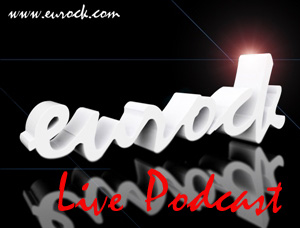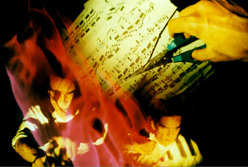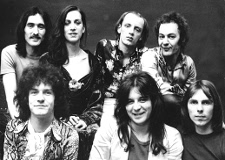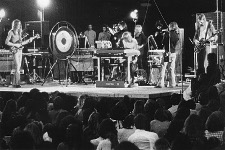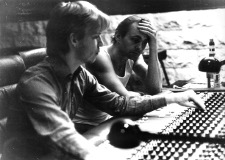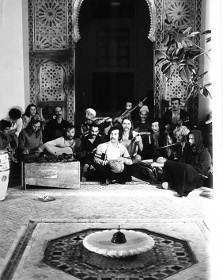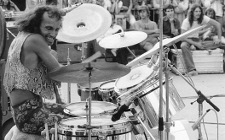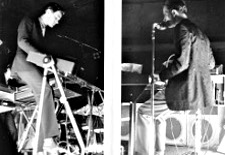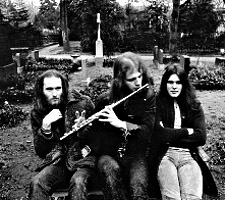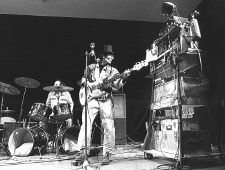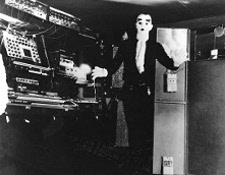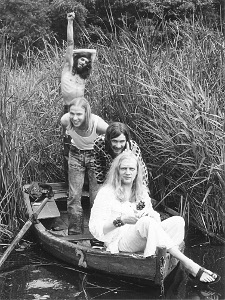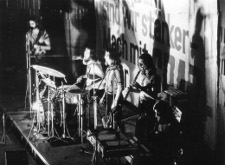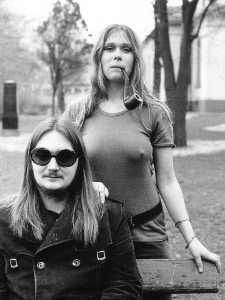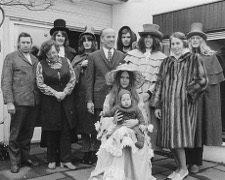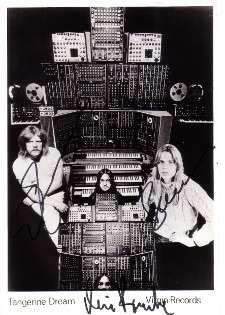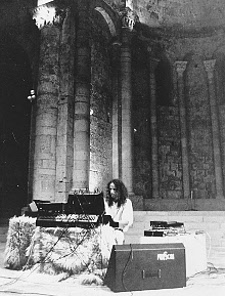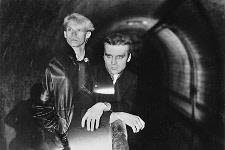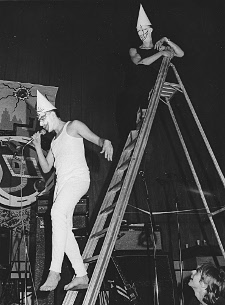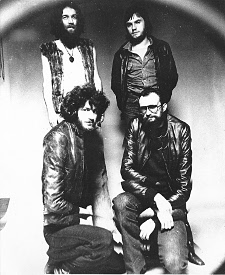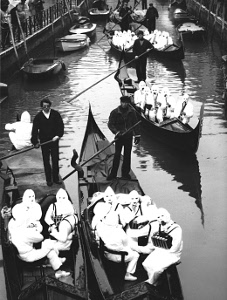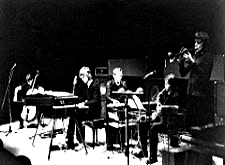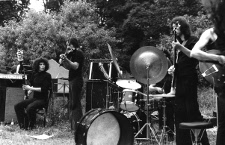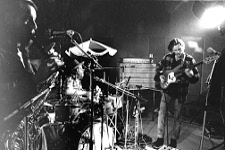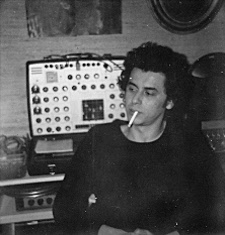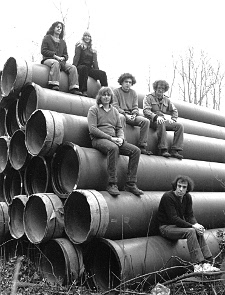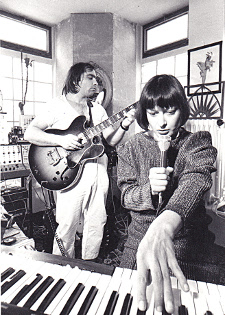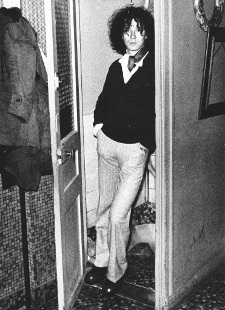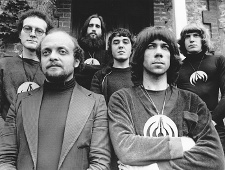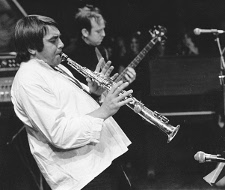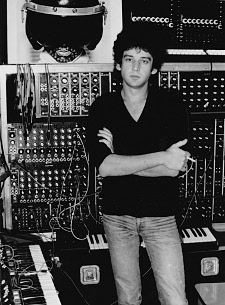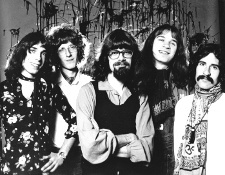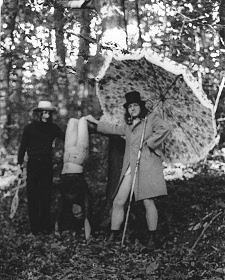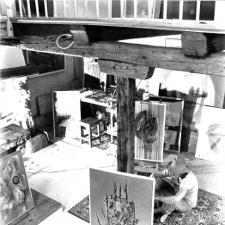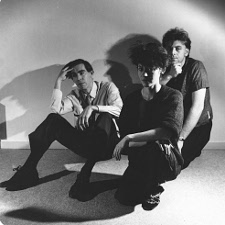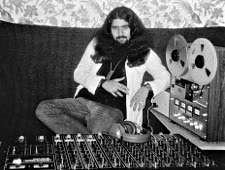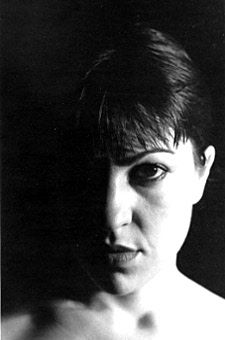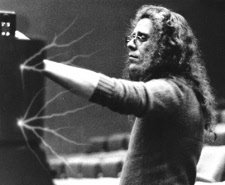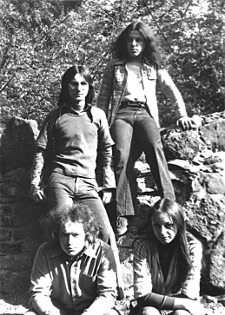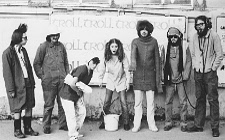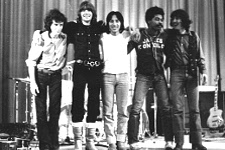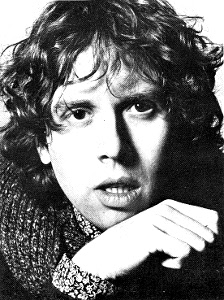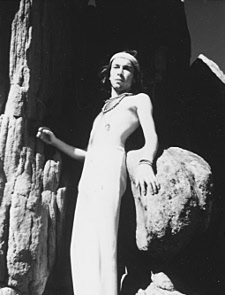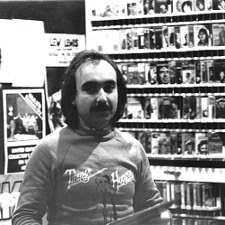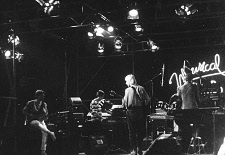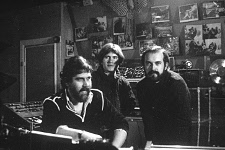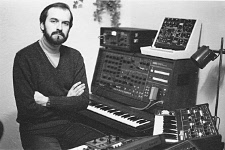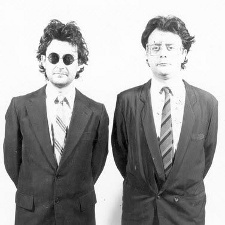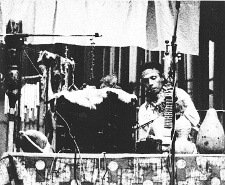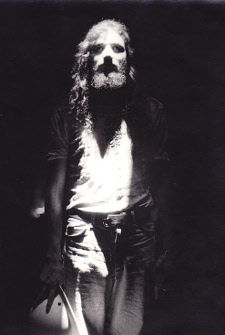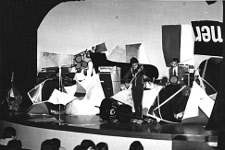The Story so far...
1970's- FM radio, Alternative Magazine & 1st US Indie Distributor of Euro Rock
1980's- D.I.Y. LP + Cassette & CD label
1990's- Distribution via the WWW
2010- Eurock.com ~ Multimedia Podcasting, Interviews & Reviews.
Label & Artist Submissions Accepted for Review...
Klassik Krautrock
Artistes Français
|
|
MUSEA Records
Bernard Gueffier Interview
Let’s start at the beginning; what was the first record you ever bought? At what age? Bernard Gueffier: My first ever record was the Moody Blues On the Threshold of a Dream which I bought during a trip to England in 1969 when I was 15 years old. I had a chance to listen to previous Moody Blues tracks on radio in ‘67/’68 and their incredible sound blew up my mind. The discovery of Mellotron was a sound revolution for me. In fact, nobody was talking about Progressive music at that time, but later, many journalists and music fans came to consider the Moody Blues the founders of Progressive Music. When did you start collecting progressive music? Was it during “the Golden Age” or later? BG: Immediately after this discovery, my taste for original music developed and then listening to early Pink Floyd, King Crimson or Soft Machine turned me into a real Progressive fan and record collector. I was living in a little town in France at that time, where it was impossible to find any of these albums. So, I started to buy from England by mail order. Most of the stuff from these catalogues was really outside of the commercial market. In the beginning, were you mostly interested in only French music, or perhaps other countries as well? BG: So my first tastes were for British bands. But I rapidly discovered the French scene, starting with Gong and Magma, which were intensively touring at that time, even in small cities. They use to play in some kind of youth centers called MJC (for House for Youth & Culture), which existed in every French town. This opened the eyes of the Progressive audience to see that this type of music was existing in several other countries. Rapidly, it became possible to find in French shops some German and Italian records as well. This allowed me to discover and collect LP's by Amon Duul, Agitation Free, Faust, Banco, PFM, etc After the 1970’s it seemed the progressive music scene died off somewhat, then experienced a bit of resurgence. In some ways the French Discographie book and MUSEA helped re-start that. Who had the original idea to start MUSEA? What year did you begin the original work on the book and start the MUSEA label? BG: After a decade of masterpieces, it happened that Progressive Music was banned from all media at the end of the ‘70's. Most groups disappeared and the production was reduced to nothing. But of course, this was only the rules of the music market which led to this situation: music business had discovered other sources of easy profit in the form of Punk music and later New Wave, so why go on carrying those old fashion Prog dinosaurs ? This attitude was obviously neglecting many music lovers - even if they were not as many as in the old days - and not taking into consideration all the musicians who went on composing interesting works. At that time, I was still trying to increase my knowledge of the Progressive scene, trading LP's and live cassettes with other Prog fans all over the world. This is how I met Francis Grosse, who had a special taste for the French scene. We rapidly decided in 1982 to gather our information and make it available for other Prog fans. This took the form of The French Rock Discography, the first edition was published in 1984. For several months, we gathered all possible information about past & existing French bands, meeting lots of musicians. The situation was the same for all of them: they had no label to release their work, so they had to self produce their albums, and no distributor to sell them. So they usually sold them to a few friends and kept the unsold copies in their cellar! As soon as we started selling our book, the usual answer from our readers was: "Where can I find this record?". So we were in that special situation where we knew musicians without listeners, and music fans without records to listen to! What else can we do ? We decided to be the missing link between them! We asked the musicians to give us some LP's on consignment, which we started selling to the Discography readers. And this was the real start of Musea. Needless to say that at that time, we had absolutely no plan for the future, no idea where this could lead us! In 1985, while going to Paris to a music festival (with appearances by Shub Niggurath, Eskaton, Uppsala and others ), Francis & me decided to found a record label and called it Musea, in reference to the Muses, Music and Museum. In order to give our readers some musical elements, we asked several bands to record an original track to be included in a cassette given free with the book. This cassette was called Prelude and included unreleased tracks by Noco Music, Troll, Joel Dugrenot, Serge Bringolf/Strave, Pataphonie, Eskaton, Uppsala, Yog Xothoth and Datura. This cassette is the first ever Musea release! I think this request to bands for new material, with the guarantee to be distributed , even at a limited scale at that time, gave hope to many musicians and contributed to the re-birth of the French Prog scene. I think there have been 3 versions of the book, how many copies have been sold up to today? BG: First two versions were printed to 1,000 copies, the third one to 2,000 copies. This was not really a huge quantity, but it was clearly showing that the audience for this kind of music did not disappear completely. The second edition was published in 1988, a third one in 1994. The content was considerably improved with each edition. Will there be another discographie released? If yes, when? BG: Definitely yes ! We never gave up this work, and went on during all these years to gather all useful information for each new edition. We plan to release the fourth edition in 2001, probably in the form of a CD-ROM. This edition will include at least three times more bands and records than the previous one ! In the beginning how did you obtain the money for the early albums? BG: It was simple: we had absolutely no money for anything ! This is the reason why in fact our first releases were totally financed by the bands themselves ! As I told you, at that time, the ONLY existing solution for Prog musicians was self production. At least with Musea they could let us do all the work regarding cover conception, pressing, legal declarations, and have the guarantee of a minimum distribution, which was real progress. But this made no difference on the bill: they still had to cover all costs. This was how our first 4 records were published: Jean Pascal Boffo Jeux de Nains (2001), Shub Niggurath Les Morts Vont Vite (2002), Elixir Sabbat (2003) and Jean Pascal Boffo Carillon (2004). With the profit we made on distributing these titles, we could afford to self-finance our next two releases: Enneade (2005) a compilation devoted to Magma related bands and Enchantement (2006) a compilation devoted to French progressive bands. How many labels does MUSEA publish today? Do they feature more than just progressive music? BG: Today, Musea includes 11 different labels, each one devoted to a special musical style: Musea for Progressive Rock, Angular for Neo Progressive, Gazul for New Music, Rebel for Rock, Brennus for Hard Rock, Thundering for Metal, Ethnea for Folk, Dreaming for Electronic Music, Bluesy Mind for Blues, Musea Parallèle and Great Winds for Jazz & Fusion. Altogether, these labels have released almost 700 titles so far. Today MUSEA releases a very large number of productions it must be very expensive. How many do you release per year and how does the company raise the money for these? BG: We usually release approx. 50 to 55 CD's per year, (i.e. one new release every week). About half of them are financed by bands, the rest by Musea. The profit on previous releases allows us to finance the new ones. I’d be interested to hear a little about how the company works. I’ve heard it is a non-profit organization. Does that mean you cannot make any profits? BG: Musea legally exists under a very special status defined by French laws, as a Non Profit Association. This allows us to exist, to make a commercial business, even to make profit. The only limit is that this profit can not be given to any private person or shared between investors. All profit has to be reinvested in our activity. This is a very important aspect of our activity: we all knew, when starting this adventure, that there was no money to be made on this music. By choosing this Non Profit status, we wanted to show to all our partners, musicians, music lovers, that our aim was not business or money, but just to share the music we love, to work in order to have it available for the largest possible audience. Our only motivation is musical passion. Does the company make a profit? What is done with the excess money you earn? BG: Of course, we are aware of the economic reality and we manage our budget as best we can, not to make profit, but only to cover our costs, pay our bills and salaries and go on existing. If it sometimes happens to have a little money left, we invest it in promotion, productions or help financially our bands to tour in international festivals. Do people get paid a salary for their work? BG: When we started Musea in 1985, it was only run by benevolent people. There was absolutely no money available to pay anybody. This happened for 10 years. But we reached a point where some tasks became too important to be done only on leisure time by benevolent members. In 1995, we hired an employee for logistics (shipments, stock keeping etc.). Then in 1998, two heads of Musea have been hired: Alain Robert as technical manager and myself as general manager. At that time, we spent all our evenings and nights, all week ends, all holidays for Musea, in addition to our regular jobs. It was too much for us and our families and we had to give up - with regrets - our benevolent status to become full time employees of Musea. Today, Musea has five employees and soon there will be seven. Of course lots of work is still done by benevolent members, approx. 15 persons.
Who is currently the “MUSEA team” of workers? BG: As said above, I'm the general manager, taking care of A&R matters, choosing bands and coordinating the whole thing. Alain Robert takes care of CD conception and pressing, as well as conceiving all printed matter (catalogues, promo documents etc.) and our web site and computers. Charles Wegner is responsible for commercial matters, sales and purchases. Alain Ricard is the head of the French distribution and Brennus label. Thiery Paya is in charge of logistics (shipments, warehouse etc.). Amongst benevolent members, we have Jean Claude Granjeon (Promotion), Alain Juliac (Musea Magazine), Bertrand Pourcheron (Japanese dept), Philippe Arnaud (Promotion Redaction), Jean Claude Hesse (Gazul label), Charles Zampol and Laurent Bocquet (Thundering label), Stefan Kost (Angular label), Ghislain Schmitt (catalogue), Jerome Mergen (catalogue), Yves Javier (catalogue), Albert Bergemont (Great Winds label), François Arnould (Author Rights dept), Philippe Gnana (Musea Magazine), Nicolas Juan (Promotion), Gilles Cador (Bluesy Mind label). We also have very active foreign representatives, running some Musea branches in several countries: Michael Suckow (USA), Enrique Gomez & Pascale Montiel (Mexico), Alexis Loppe Bello (Venezuela), John Bollenberg (Benelux),Jaume Pujol (Spain), Vitaly Menskikov (Russia) etc. How many countries does MUSEA have distribution in now? BG: Musea is distributed in 90 countries: North & South America, all Europe from Scandinavia, EC, Eastern Europe, Russia, Middle East and Far East, Australia and New Zeeland. In some countries, we have only one exclusive distributor, taking care of one or several labels and providing all local shops with our titles. In some other countries, we deal with several importers or directly with shops and retailers. In the latter cases, we also sell directly to customers by mail order. What are the average sales for a new MUSEA title by a known artist? What about new artists? BG: It is difficult to talk about an average quantity sold, as there are huge differences between our best sellers and our lesser ones: Prestigious reissues like Sandrose or Pulsar "Halloween" reach quantities over 10,000 copies. For the lesser releases, we can go sometimes no higher than 300 copies! The average sales could be around 1,500 to 1,800 copies. There is no real difference between reissues and new artists: we have good sales as well for 70's reissues (Trace, Asia Minor, Kaipa, Neuschwanstein, Mona Lisa, Atoll all between 4,000 and 5,000 sales) as for new artists (Anglagard, Now, Christian Decamp, Minimum Vital, Eris Pluvia, XII Alfonso, Galadriel). Does MUSEA promote concerts or have other musical activities in France, or elsewhere? BG: We knew since the start of Musea that producing and distributing records is a completely different job than arranging concerts. So we always kept apart from this activity. It's really too much work and risk, and could cause some large loses of money that would be fatal to Musea's existence! We also know that music needs to exist on stage, not only on records. So our choice is to help financially concert arrangers who decide to include Musea bands in their programs. In that sense, being a large source of bands for concerts arrangers, we’ve cooperated with some famous events such as ProgFest, NearFest, Baja Prog, Rio Art Rock Festival etc. Do you think the progressive scene is still growing now, or has it leveled off? BG: Obviously, the Progressive scene was bigger in terms of audience in the 70's. But after the dark period of the 80's when it was almost considered non-existent, it's slowly, but regularly growing since the mid 80's. Today, the Progressive scene is full of diversity and creativity, building bridges between different musical styles, and its audience is increasing every day. You know in the mainstream musical press in the 80's, it was kind of a shame to listen to Prog'! A Prog lover belonged to another age, they were considered fossils! Today, the attitude of the official press is much different as after 30 years, Progressive music has gained a kind of respectability, or at least the right to exist amongst other musical styles. Its a kind of peaceful coexistence! I feel that so many new labels and new releases swamp the scene, there is so much to choose from and only a certain audience. Do you think we are seeing “the law of diminishing returns” affect the marketplace today? BG: You are right, it has become today so easy to record and manufacture a CD with the new technology that anybody can do it by himself. In the past, the investment to release a record was so high that any project had to go through the "filtration" of record companies, where professionals could select the most interesting ones. Of course, that caused a kind a market censure, but it mainly avoided the flooding of the market with music of little or no interest. Today's listeners have to make the selection themselves, they have to be more cautious. They have to be more active, to find the information by themselves in order to choose the really interesting music. This is also the responsibility of distributors to help them to make their choice. Apart from our own releases, our mail order catalogue MusiCDirect includes several thousands of independent or self produced productions. In fact we receive from the whole world 10 times more submissions. It's our responsibility to select from this mass of music the few projects which we think are interesting for our audience, and avoid that the other ones come on the market. Does MUSEA have any special plans for the future to perhaps create wider interest in progressive music? BG: Yes, we started a very special project in France these past few months in order to reach a wider audience. In the past, we had to go through distributors in order to have our CD's in retail shops. This was the weak point of the chain between us, the label and our audience. Due to the rather low quantity sold, and thus the low profit made, distributors were not really interested to invest their time on our releases. They would only satisfied the pre-existing demand, and had no real desire to increase the audience. For this reason, we started in 2000 our own distribution network in France. We have today 11 salesmen visiting over 500 record shops in France and offering directly to shop owners our releases. This offers us the ability to cut out any intermediary and thus increase our French sales. We hope to export this experience to more countries in the future. Personally I like all kinds of different musical styles. For your own enjoyment, do you listen to more than just progressive music yourself, or is that your exclusive interest? BG: For several decades, I’ve opened my ears to lots of different musical styles, weird Rock ala Zappa or Beefheart, New Music of all kinds, from Fred Frith to Urban Sax, recent classical or contemporary music (Stravinsky, Bartok, Varese, Boulez), jazz (Pat Metheney, Keith Jarrett, Chick Corea), folk music etc. Progressive music has a special status in my mind as it was the music of my adolescence. I experienced some emotions connected with this music which I will never find with any other music, any time. But this is only my personal story, it has nothing to do with the music itself ! What would be your 5 all time favorite progressive albums? And do you have 5 all time favorite non-progressive albums? Progressive: 1) Soft Machine - FOURTH 2) Magma – M. D. K. 3) Genesis - FOXTROT 4) Yes- CLOSE TO THE EDGE 5) King Crimson - RED Non Progressive: 1) Zappa – FREAK OUT 2) Captain Beefheart – LICK MY DECALS OFF 3) Fred Frith - GRAVITY 4) Carla Bley - MUSIQUE MECANIQUE 5) Terry Riley – A RAINBOW IN CURVED AIR
- Archie Patterson
|
 reviews features podcasts email bio
reviews features podcasts email bio